To ensure this thinking is effectively communicated we have created the Sinews of Sustainable Development Speakers Series: this is a public event. We’re exploring the questions that shape our world. We invite global experts, senior policymakers, and business leaders to deliver Sinews Lecture series at the University of Cambridge. Prior to the COVID the lecture series were held in person in Cambridge followed by the reception at a formal hall at one of the historic colleges. Since the pandemic, the Sinews of Sustainable Development lecture series moved to a virtual setting, followed by an online networking for a global exchange of knowledge and expertise. The purpose of the lecture series is to provide a global platform for Cambridge students and professors with the opportunity to interact directly with the influential leaders and global participants in a private setting through candid dialogues, whether virtually or in person.
The topics include areas such as private sector development, peace from conflict, gender rights and education. We host one event per term and invite major thought leaders and let the speakers lead the conversation. In our previous Sinews events, we had the honour to have invited Rt Hon. Patricia Scotland QC, Secretary - General of the Commonwealth of Nation; Rt Hon. Greg Clark MP, Secretary of State for Business, Energy and Industrial Strategy, UK; Larry Elliott, Economics editor of the Guardian; and Lord Mark Malloch Brown to name a few on the panel.
UNBELIEVABLE!
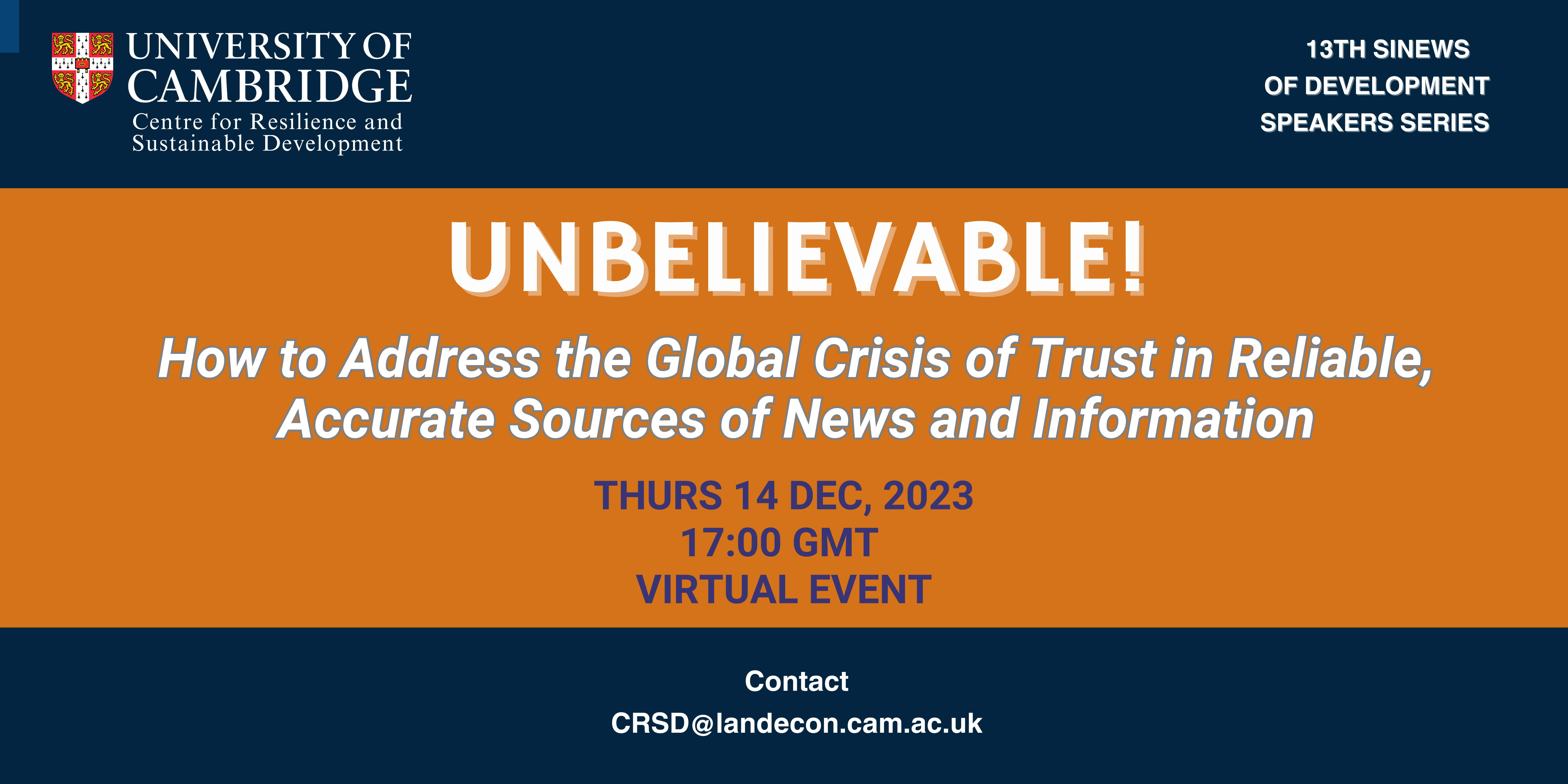
Thursday 14th December, 2023, 17.00 GMT
There is a global crisis of trust in reliable, accurate sources of news and information. This has serious real-world consequences and undermines trust in democratic governments, elections and institutions.
State and non-state actors spread malicious disinformation, misinformation and conspiracy theories, amplified by social media and AI-driven deep fake digital technology and data manipulation. Mendacious politicians tell “big lies” that credulous audiences believe, fueled by partisan media funded by shadowy donors with hidden agendas. Many states censor legitimate news channels.
How should we tackle the crisis of trust in reliable, accurate sources of news and ensure access to trustworthy news and information, to protect democracy?
Please join us online for this FREE University of Cambridge Sinews of Development event as we consider one of the most important issues in development with leading experts.
How can we empower women, and protect children, caught up in war? Lessons from Afghanistan
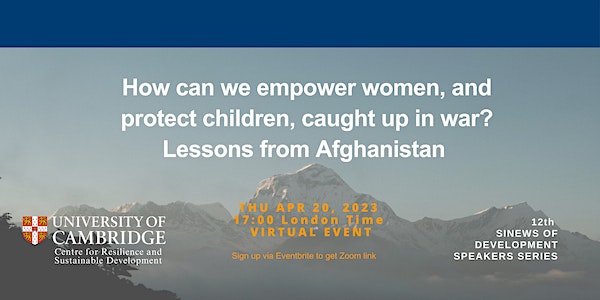
Thursday, 20 April 17:00 - 18:30 GMT
How can we now help to ensure and support the participation of women in the development of Afghanistan and guarantee that the rights of women and girls will be protected, in the face of this avoidable disaster?
And what does this terrible saga tell us about the obligation to support and empower women, and to protect children, especially girls, in the face of conflict and war?
Global Britain and International Development in a post Brexit, COVID-19, and Ukraine World.
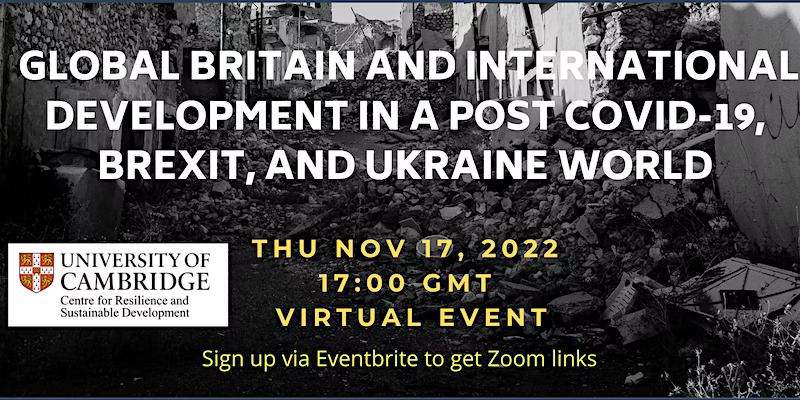
Thursday, 17 November 2022 17:00 - 18:00 GMT
What should be the role of “Global Britain” when it comes to international development in a world that has been severely disrupted by Brexit, COVID-19 and Russia’s brutal war of aggression against Ukraine?
What is the Future of International Development?
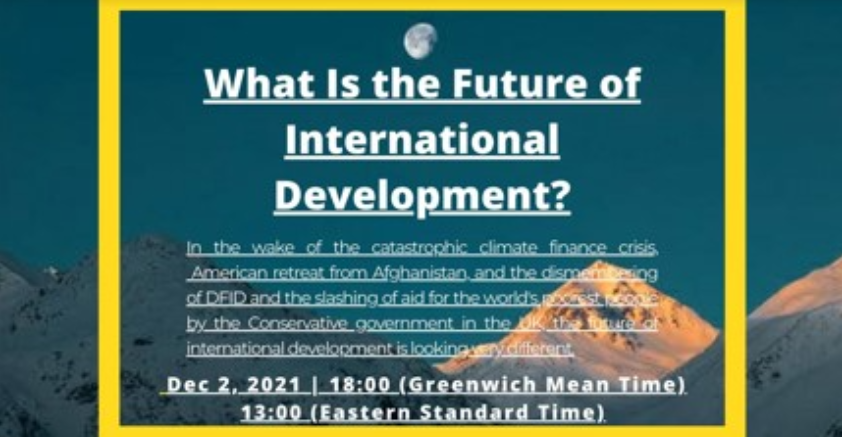
Thursday, 2 December 2021 18:00 to 19:30 GMT
In the wake of the catastrophic climate finance crisis, American retreat from Afghanistan, and the dismembering of DFID and the slashing of aid for the world's poorest people by the Conservative government in the UK, the future of international development is looking very different.
Climate Change Disruption in a Digital Age: What Happens to the World of Work and Play?
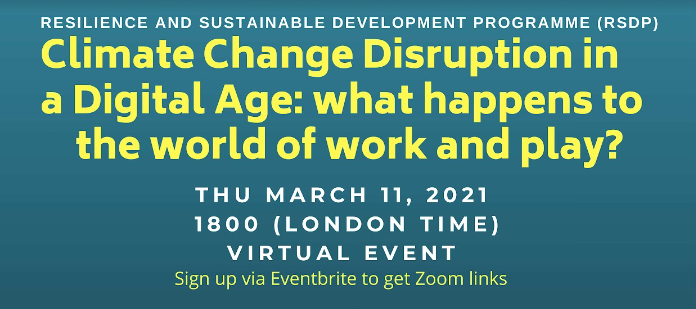
Thursday, 11 March 2021 18:00 to 19:30 GMT
We are in the midst of a sustainability tipping point, exemplified by Larry Fink, Blackrock’s CEO, whose recent annual letter starts by saying, “There is no company whose business model won’t be profoundly affected by the transition to a net zero economy”. The future of work will be different.
Their World, Their Future, Action Now: How Can We Invest in the Youth?
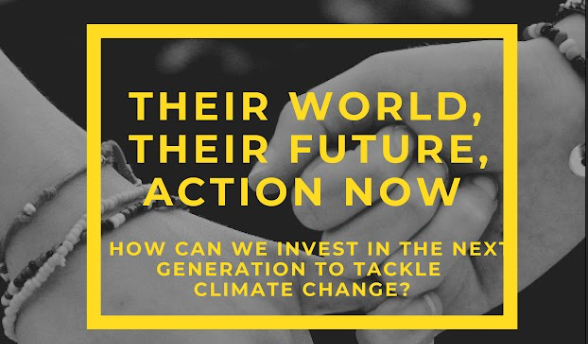
Thursday, 15 October 2021 18:00 - 19:30 GMT
It is no longer a debate that climate change poses an existential threat to humanity and the evidence is that young people feel the urgent need for change especially acutely. They are understandably anxious about their future, at a time of great uncertainty. We have seen young people increasingly willing to make their voices heard, to take action and to hold those in power to account. So, how can we harness this powerful force for the public good and, in the process, help young people to fulfil their potential and channel their energies to create real impact?
Britain after Brexit: How to Redesign the UK's Role in Sustainable Development
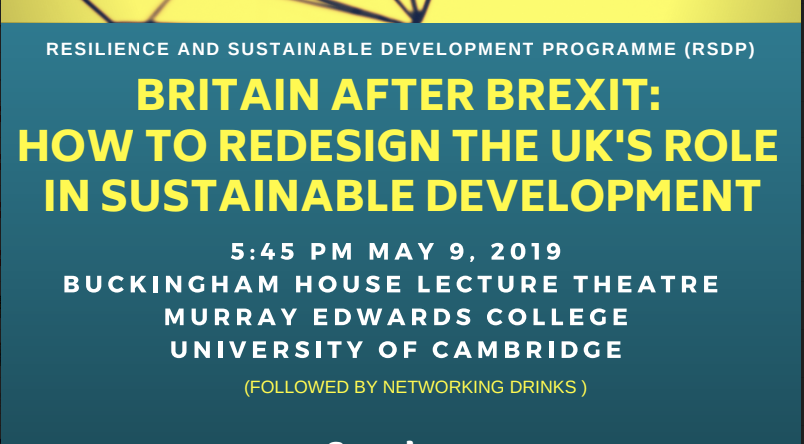
Thursday, 9 May 2019 17:45 - 19:15 BST
After months of negotiation on a Brexit deal, it is still unclear how things will work in the long-term in terms of national and international development. It is impossible to know the future, and to have any perfect solutions. But it is not impossible to use logical deduction and socio-systems level understanding to analyse how we can redesign the UK's role to promote sustainable development in the post-Brexit world. As a part of the Resilience and Sustainable Development Programm (RSDP) lecture series, we bring in the following experts from academic, political and development background to discuss, debate and deliberate on how to redesign the UK's role in sustainable development.
Genocide & Ethnic Violence: Designing a Sustainable Peace
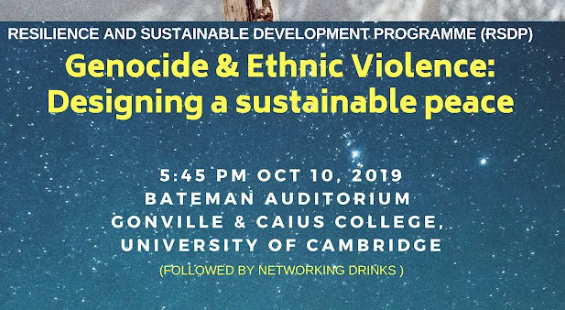
Thursday,10 October 2019 17:45 – 19:00 GMT
What system changes are needed to deliver sustainable peace for the peoples who suffered genocide and ethnic violence? Panelists will debate and be challenged on what system changes are needed to deliver sustainable peace for the peoples who suffered genocide and ethnic violence. The event will be recorded, and a drinks reception will follow the speakers and discussion.
Syria Is A Catstrophe. Now What?
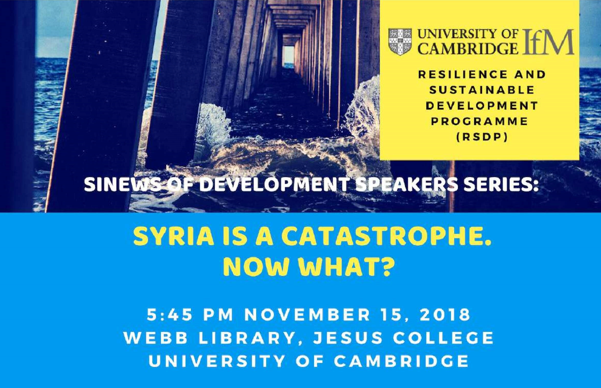
Thursday, 15 November 2018 17:45 – 19:00 GMT
The event will be chaired by the Right Honourable Andrew Mitchell, MP and features H.E Ambassador Rami Mortada of Lebanon; the BBC's Middle East Editor, Jeremy Bowen; Dr David Nott, OBE, the founder of the David Nott Foundation and Dr. Roxane Farmanfarmaian, a founding member of Cambridge Centre for the International Relations of the Middle East and North Africa (CIRMENA), of the University of Cambridge. Discussants will debate and be challenged on the roles of the various stakeholders as well as their ideas about the resilience and sustainable development of Syria and the future of the people of Syria.
Sinews of Sustainable Development: Why Conflict Resolution is the Key
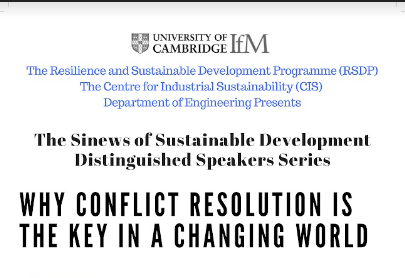
Thursday, 17 May 2018 17:30 – 19:30 BST
The Sinews of Sustainable Development: Why Conflict Resolution is the Key in a Changing World:
Conflict resolution is a dynamic decision-making process, in which the resolution of the problem is obtained by making a series of interdependent decisions to adapt to the changing realities, interests, and relationships between the conflicting parties. Conflict and its resolution occur at many levels: between individuals, organizations, and societies. What is the role of conflict resolution in driving the global agenda for resilience and sustainable development? What needs to happen to achieve a resolution the protracted conflicts such as Syrian or Palestinian or Ukrainian one? Are they commercial interests to maintain these conflicts unresolved? Discussants will challenge and debate on the roles of the conflict resolution in the context of resilience and sustainable development.
Climate and Sustainable Development Finance for Developing Countries
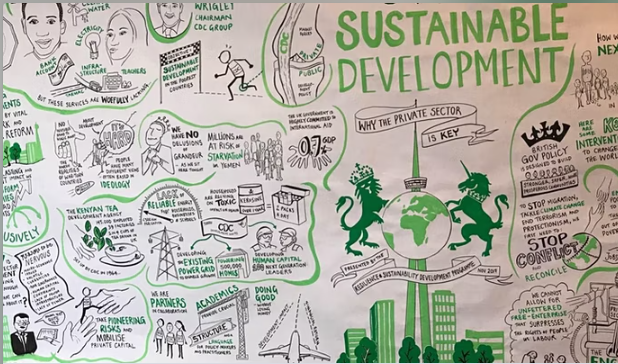
Thursday, 8 February 2018 15:00 – 16:00 GMT
Sustainable Investment: an investment discipline that seeks to generate both a financial return and proactively create environmental and social benefits. Investments include publicly-traded stocks, bonds, and institutional funds. Financial institutions exercise considerable influence - in some cases control - over investment and management decisions which could be brought into play for the benefit of people, environment, and the politics of common good. The Keynote Speaker Mr Philip Brown is the Head of Green and Social Bond Origination, Citi Global Markets.
What is the Future of UN?
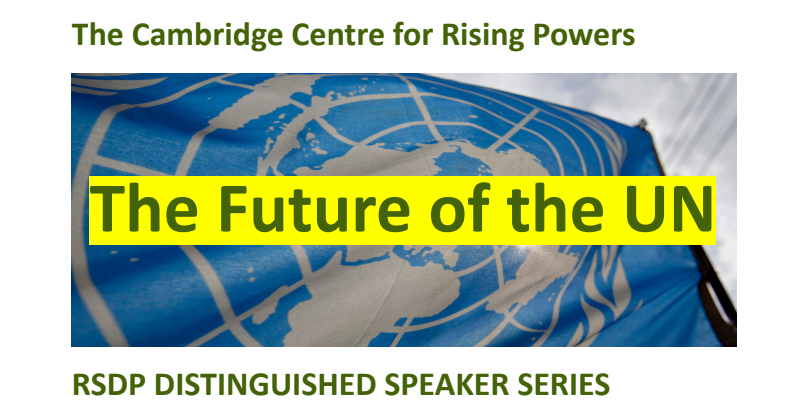
10 May 2017 Wednesday 16:30 - 18:00 BST
The Resilience and Sustainable Development Programme (RSDP) announces the first in a series of discussions examining the role of the UN and the challenges facing its accountability, impact and future. The Rt Hon Andrew Mitchell will chair a discussion with Rt Hon Lord Mark Malloch-Brown KCMG on the future of the UN. They will be joined by Cambridge experts Dr Emma Mawdsley, Dr Kun-Chin Lin and Dr Nazia Mintz Habib for a conversation on the role of the UN in the sustainable development agenda.
Sinews of Sustainable Development: Why the Private Sector is the Key?
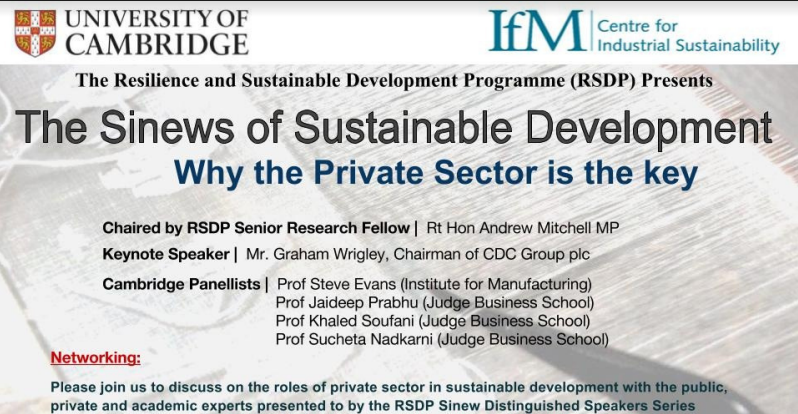
16 November 2016 Wednesday 17:00 - 19:00 GMT
Banner image © wenmei Zhou/DigitalVision Vectors via Getty Images

